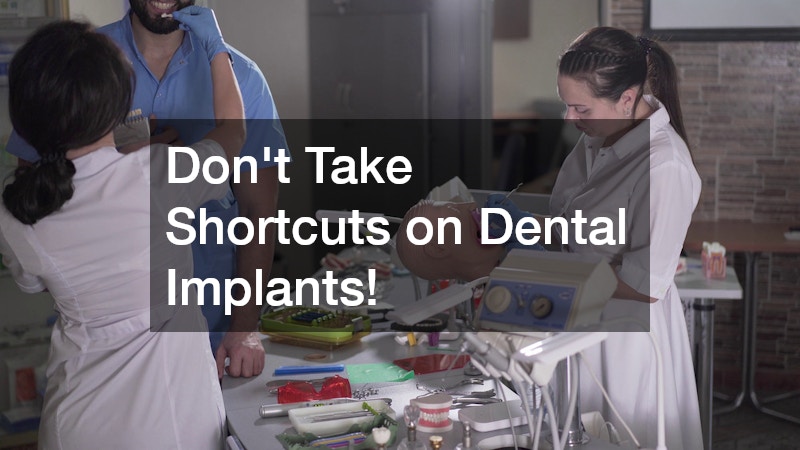Don’t Take Shortcuts on Dental Implants: Why Precision Matters
Dental implants are one of the most effective long-term solutions for missing teeth, offering a natural look, durable function, and a renewed sense of confidence. But as demand grows, so does the number of patients looking for fast or low-cost alternatives—often at the expense of quality and safety. When it comes to something as permanent and vital as your oral health, cutting corners is never worth the risk.
Here’s why you should never take shortcuts on dental implants—and why trusting a qualified oral surgeon is essential for long-term success.
Why Dental Implants Demand Precision
A dental implant is more than a cosmetic fix—it’s a surgical procedure that requires meticulous planning and placement. The implant itself is a titanium post that must integrate securely with your jawbone, a process called osseointegration.
If the implant is even slightly misaligned or improperly placed, it can result in bite issues, jaw pain, and eventual implant failure.
Unlike simple tooth restorations, implants require a deep understanding of bone structure, nerve placement, and sinus proximity. This is where precision matters most—and only a trained oral surgeon can provide that level of expertise.
Common Shortcuts People Take with Dental Implants
In an effort to save time or money, many patients unknowingly make decisions that compromise the outcome of their dental implants. Common shortcuts include:
-
Choosing unqualified providers: Some general dentists or overseas clinics offer implants at reduced rates without the surgical credentials necessary for proper placement.
-
Skipping diagnostic imaging: Tools like CT scans and digital x-rays are critical in evaluating bone density and structure, but low-budget services often skip these essential steps.
-
Rushing healing times: Implants need time to heal and integrate. Some clinics promise same-day results without explaining the long-term risks.
-
Using subpar materials: The quality of the implant itself matters. Cheap materials may not last and can increase the chance of rejection or infection.
Every shortcut above can result in complications, discomfort, or costly corrective procedures in the future.
The Real Risks of Taking Shortcuts
When you cut corners with dental implants, the consequences can be both physical and financial. Improper placement may cause:
-
Jaw pain and bite misalignment due to poor angulation.
-
Infection if sterile protocols or healing instructions are ignored.
-
Implant failure, requiring removal and a lengthy healing period before a second attempt.
-
Nerve damage, especially in the lower jaw, which can cause long-term numbness or tingling.
These risks don’t just affect your oral health—they can impact your overall well-being and self-esteem. Fixing a failed implant is often more expensive and painful than getting it done right the first time.
Role of a Qualified Oral Surgeon in Implant Success
An oral surgeon is specially trained in facial anatomy, bone grafting, and surgical techniques. Unlike general dentists, they undergo years of additional education and hands-on training focused on complex procedures like dental implants.
A skilled oral surgeon will:
-
Use 3D imaging to plan the ideal implant position.
-
Know how to manage complications like insufficient bone or sinus interference.
-
Provide sedation options for comfort and anxiety management.
-
Monitor healing progress and ensure proper integration.
This level of precision is key to ensuring your dental implant feels, functions, and looks natural for years to come.
How to Avoid Mistakes When Considering Dental Implants
Avoiding shortcuts starts with asking the right questions. Before committing to any provider, be sure to:
-
Verify credentials and check if they are a certified oral surgeon.
-
Ask about the diagnostic tools and technology used in planning.
-
Understand the full process—including healing time, follow-up visits, and aftercare instructions.
-
Request before-and-after photos and success rates from previous implant cases.
The more informed you are, the better decisions you can make about your oral health.
Questions to Ask Before Getting Dental Implants
To ensure you’re choosing the right professional and approach, consider these key questions:
-
Are you a board-certified oral surgeon or implant specialist?
-
What imaging and diagnostic tools will be used?
-
What kind of implants do you use, and what’s your success rate?
Getting clear answers can give you peace of mind and confidence in your care.
Long-Term Value vs. Short-Term Savings
It may seem appealing to save money on dental implants upfront, but remember: your teeth are an investment in your health and quality of life. The cost of correcting a failed implant far outweighs the cost of doing it right the first time.
When performed with care and precision, dental implants can last decades—offering comfort, stability, and beauty. When rushed or done cheaply, they can cause pain, emotional stress, and additional financial burdens.
Conclusion: Choose Quality Over Shortcuts
Your smile is too important to risk on cheap fixes or rushed procedures. Dental implants are a surgical investment that requires precision, planning, and professional expertise. By working with a certified oral surgeon, you’ll not only protect your health—you’ll ensure your implants are built to last.
Take your time. Do the research. And most importantly, never take shortcuts when it comes to your smile.

